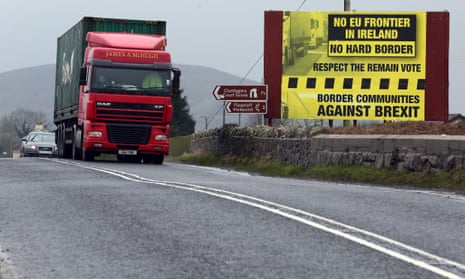The UK cannot get a legally watertight transition deal until it resolves the status of the Irish border as part of a wider divorce settlement with the EU, sources have said, as Brexit talks move into an intense phase.
Senior UK and EU officials are due to meet this weekend in Brussels, ahead of an EU27 Brexit summit on Friday, when Theresa May hopes to bag the transition deal that British business demands.
But firms will be denied certainty on the transition deal, as EU sources stress the best the UK can get in March is a political text, not a legally binding treaty giving cast-iron security for companies across Europe.
EU negotiators “will make it crystal clear that this agreement on transition is only a political agreement”, a senior source told the Guardian. But even that is on a knife edge. While optimism has risen in recent days, British negotiators will be told they need to move closer to the EU’s insurance option for avoiding a hard border on the island of Ireland - a proposal that is anathema to the Democratic Unionist party, which is propping up Theresa May’s government.
“The whole agreement on the withdrawal will be contingent on a solution on Ireland,” the source said. “And it is politically unthinkable that we would wrap up everything and that you wouldn’t have a solution on the Irish border. The Irish would never accept it, but also the rest of the union will not accept it, because it would be toying with the integrity of the single market.”
A second diplomat said he was “cautiously optimistic” that EU leaders would sign off the transition, but warned the deal could unravel in the autumn without agreement on Ireland and the rest of the UK divorce treaty. “You could agree on transition parts, but it is still not the withdrawal agreement.”
The EU has outlined three options for avoiding a hard border: a deep free-trade agreement with the UK; “specific solutions” that depend heavily on technology; or, failing both of those, Northern Ireland remaining in “full regulatory alignment” with the EU.
That third option would put the EU-Irish border in the Irish Sea and is toxic for the DUP, while May has said no British prime minister could ever agree to it.
Ireland, backed by some of the EU’s most senior leaders, is insisting the UK spells out its commitment to the insurance plan sooner rather than later, while stressing the first two options remain on the table as part of a future trade deal.
Sources close to the talks say it is too early to predict how the timing will work, ahead of a flurry of meetings next week. The Brexit secretary, David Davis, is expected to meet the EU’s chief negotiator, Michel Barnier, in Brussels on Monday. EU ministers - without the UK - will assess British progress on Tuesday before handing the baton to leaders at the end of the week.
The president of the European council, Donald Tusk, said last week that London could not assume negotiations would move on to other issues without solving the issue. If that happened, “my response would be Ireland first”.
In Brussels, that is being interpreted as a clear political message and has created varying levels of optimism about a transition deal. Germany’s Brexit envoy, Peter Ptassek, tweeted this week that “a lot of progress” was being made on the UK’s withdrawal agreement. “Stay tuned.”
Other sources stress there is still a long way to go, with the Irish parts of the text still coloured red on an EU internal traffic light grid, rather than amber, which may allow talks to progress.
The content of the transition is less fraught for negotiators. EU diplomats expect the UK to accept the transition on the EU’s terms, meaning Britain would obey all EU rules with little or minimal say in the institutions.
Separately, a committee of MPs is set to warn in a report in Sunday that Britain is so unprepared for Brexit that it should consider postponing the UK’s leaving date.
The Commons Brexit select committee is set to recommend that May should request an extension to the EU’s article 50 process beyond next March, the HuffPost reported.
Any extension of Brexit talks would have to be agreed unanimously by all 27 EU countries.
Diplomats have indicated they would be open to rolling over negotiations for a few weeks, but a longer extension could run into problems. Several member states, especially France, and the European parliament, which will approve the final withdrawal agreement, have stressed that the UK should be out of the EU before the next European elections, due in May 2019.
